How Many Times Can You Take the NCLEX?
Learn about NCLEX retake limits, waiting periods, and strategies to pass on your next attempt

How Many Times Can You Take the NCLEX?
The National Council Licensure Examination (NCLEX) is a critical step for nursing graduates to obtain their license. But what happens if you don't pass on your first try? Here's what you need to know:
- 📊 Maximum Attempts: Varies by state (typically 3-8 attempts per year)
- ⏱️ Waiting Period: 45 days between attempts
- 📝 Retake Process: Requires reapplication and fee payment
- 📈 Pass Rates: 73.6% first-time pass rate (2024 NCSBN data)
🚨 NCLEX Retake Limits by State
| State | Maximum Attempts per Year | Waiting Period | Additional Requirements | Sources |
|---|---|---|---|---|
| Alabama | Up to 8 attempts | 45 days | None | [1] |
| Alaska | Up to 8 attempts | 45 days | Must pass within 2 years of first attempt; remedial course required after 2 years | [2] |
| Arizona | Up to 8 attempts | 45 days | None | [3][4] |
| Arkansas | Up to 8 attempts | 45 days | None | [5][6] |
| California | Up to 8 attempts | 45 days | None | [*] |
| Colorado | 3 | 45 days | Within 3 years of first attempt; for 4th attempt within 2 years, must evaluate deficiencies and petition | [7][8][9] |
| Connecticut | Up to 8 attempts | 45 days | None | [*] |
| Delaware | Up to 8 attempts | 45 days | Retake allowed up to 5 years; remedial course if >2 years since graduation | [10] |
| Florida | 3 | 45 days | After 3 failures, remedial course required before 4th attempt | [11][12] |
| Georgia | Up to 8 attempts | 45 days | Must pass within 3 years of graduation | [13][14][15] |
| Hawaii | 3 | 45 days | After 3 failures, remedial course and retake within 6 months required | [16][17] |
| Idaho | Up to 8 attempts | 45 days | None | [18] |
| Illinois | Up to 8 attempts | 45 days | Must pass within 3 years of initial application | [*] |
| Indiana | Up to 8 attempts | 45 days | After 3 failures, board review required before retaking | [19] |
| Iowa | Up to 8 attempts | 45 days | None | [20][21] |
| Kansas | Up to 8 attempts | 45 days | Petition required after 24 months; nursing program completion required after 5 years | [22] |
| Kentucky | Up to 8 attempts | 45 days | After 2+ failures, must reapply, pay fees, and complete background checks | [*] |
| Louisiana | 4 | 45 days | Max 4 attempts within 4 years; must re-enter nursing program after 4th failure | [23][24] |
| Maine | Up to 8 attempts | 45 days | None | [25] |
| Maryland | Up to 8 attempts | 45 days | None | [*] |
| Massachusetts | Up to 8 attempts | 45 days | None | [*] |
| Michigan | Up to 8 attempts | 45 days | Must pass within 3 years of graduation; else competency certification required | [*] |
| Minnesota | Up to 8 attempts | 45 days | Retake request within 8 months; retake within 1 year | [*] |
| Mississippi | 6 | 45 days | Must pass within 2 years of graduation | [26] |
| Missouri | Up to 8 attempts | 45 days | Must file repeat exam application and retake within 1 year | [*] |
| Montana | 5 in 3 years | 45 days | Study plan required after each failure; nursing program completion after 5th failure | [*] |
| Nebraska | Up to 8 attempts | 45 days | None | [27][28] |
| Nevada | 4 | 45 days | Board review after 4th attempt | [29] |
| New Hampshire | 5 | 45 days | Includes attempts in other states; remediation after 3rd failure | [30][31] |
| New Jersey | 3 | 45 days | 30-hour remediation course required after 3rd failure | [32] |
| New Mexico | 5 | 45 days | None | [*] |
| New York | Up to 8 attempts | 45 days | None | [33] |
| North Carolina | Up to 8 attempts | 45 days | None | [34][35] |
| North Dakota | Up to 8 attempts | 45 days | None | [36] |
| Ohio | Up to 8 attempts | 45 days | None | [37] |
| Oklahoma | Up to 8 attempts | 45 days | Must take NCLEX within 2 years of program completion or refresher course required | [38][39] |
| Oregon | 4 | 45 days | None | [*] |
| Pennsylvania | Up to 8 attempts | 46 days | None | [40] |
| Rhode Island | Up to 8 attempts | 45 days | None | [41] |
| South Carolina | 3 in 1 year | 45 days | Remediation required if not passed within 1 year | [42] |
| South Dakota | Up to 8 attempts | 45 days | None | [*] |
| Tennessee | Up to 8 attempts | 45 days | Must pass within 3 years of graduation or complete another program | [43] |
| Texas | Up to 8 attempts for 4 years | 45 days | Must complete nursing education program after 4 years without passing | [44] |
| Utah | Up to 8 attempts | 45 days | None | [45] |
| Vermont | Up to 8 attempts | 45 days | Remediation after 2nd failure; different review course after 3rd failure | [46] |
| Virginia | Up to 8 attempts | 45 days | Must pass within 3 years of graduation; remedial course after 3 failures | [*] |
| Washington | Up to 8 attempts | 45 days | None | [47][48] |
| West Virginia | Up to 8 attempts | 45 days | Remediation after 2 failures; additional coursework after 4 failures | [*] |
| Wisconsin | Up to 8 attempts | 45 days | None | [49] |
| Wyoming | 10 attempts in 5 years | 45 days | Maximum 10 attempts within 5 years of graduation | [50] |
Note:
The phrase "Up to 8 attempts per year" means candidates can take the NCLEX exam a maximum of eight times within any rolling 12-month period. This does not mean unlimited attempts. The 45-day waiting period between attempts effectively limits candidates to 8 attempts per year unless otherwise specified by state regulations.
📆 Retake Timeline: What to Expect
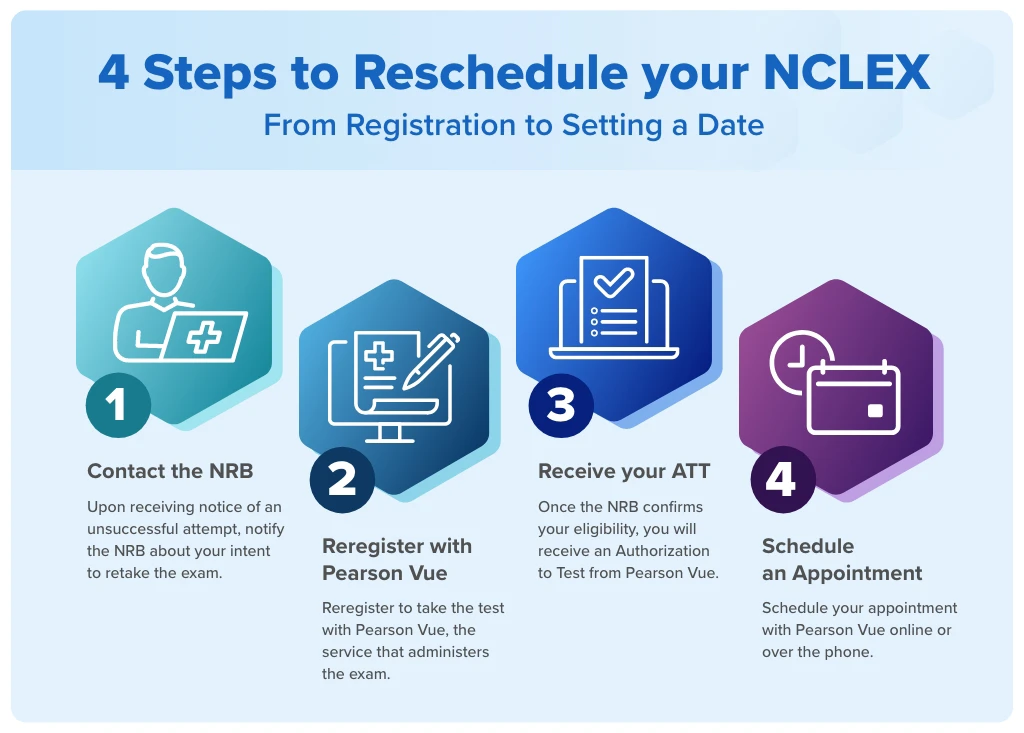
1. Immediate Steps After Failing
- Receive your Candidate Performance Report (CPR)
- Analyze weak areas (e.g., Pharmacology, Management of Care)
- Create a retake study plan
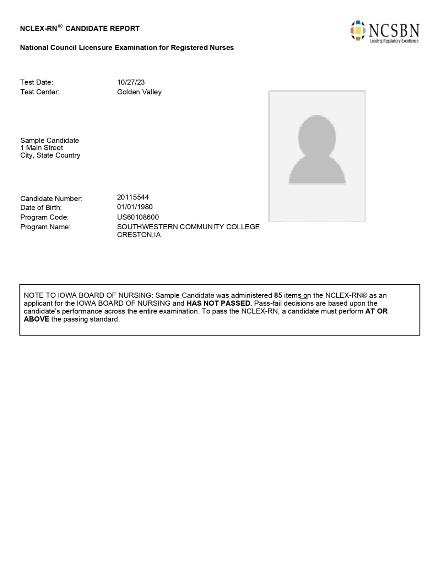
2. 45-Day Waiting Period
- Focus on improving weak areas
- Use resources like UWorld and NurseAchieve
- Practice with Next-Gen NCLEX (NGN) questions
3. Reapplication Process
- Submit retake application to your state board
- Pay the $200 exam fee
- Receive new Authorization to Test (ATT)
🧰 Essential Resources for NCLEX Retakes
| Resource | Best For | Time Commitment | Direct Link |
|---|---|---|---|
| UWorld | Question pattern mastery | 2-3 hrs/day | Visit Site |
| Saunders 9th Ed | Foundational knowledge | 1 hr/day | Buy Now |
| Mark K Lectures | Priority frameworks | 30 min/day | Access Notes |
| NurseAchieve | CAT Exam Simulation | 1x weekly | Try Free |
| Simple Nursing | Visual Pharm Learning | 30 min/day | Watch Videos |
Your Secret Weapon: The Candidate Performance Report (CPR)
If you’ve taken the NCLEX and didn’t pass, you’ll receive a Candidate Performance Report (CPR). Many view this as a dreaded document, but seasoned test-takers know it's a goldmine. Think of it less as a critique and more as a highly personalized study guide tailored precisely to your weaknesses.
Unpacking Your CPR: What It Reveals
- Performance Breakdown: The CPR dissects your performance across the NCLEX's key client needs categories: Safe and Effective Care Environment (Management of Care, Safety & Infection Control), Health Promotion and Maintenance, Psychosocial Integrity, and Physiological Integrity (Basic Care & Comfort, Pharmacological & Parenteral Therapies, Reduction of Risk Potential, Physiological Adaptation). It also breaks down your performance on Clinical Judgment, a critical component of the Next Generation NCLEX (NGN).
- Strengths & Weaknesses: For each category, your performance is flagged as 'Below,' 'Near,' or 'Above' the passing standard. This color-coded roadmap instantly highlights where your efforts need to be concentrated.
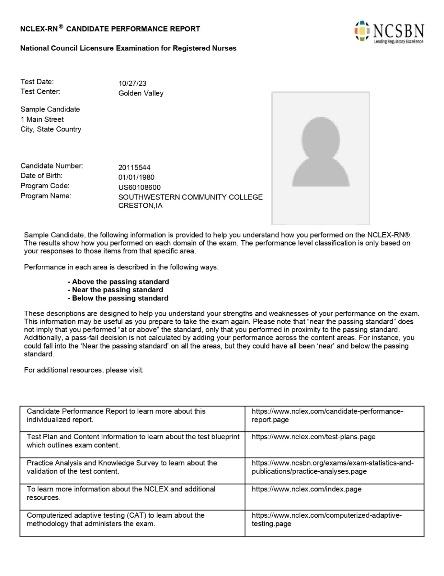
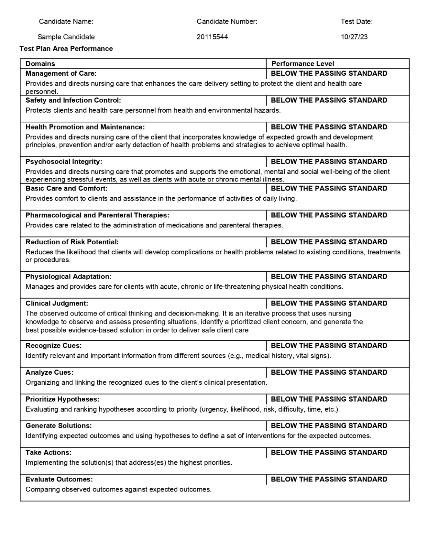
Maximizing Your CPR for a Smarter Retake
- Targeted Review: This is where the magic happens. Instead of broadly re-studying everything, focus intensely on the areas where your CPR indicates 'Below' or 'Near the Passing Standard.' This precision saves time and boosts efficiency.
- Adapt Your Study Plan: If you scored 'Below' in pharmacology, for example, your new study plan should heavily integrate pharm review, perhaps through dedicated question banks, flashcards, or even a full review course focused on that subject. Consider resources like UWorld or SimpleNursing if you haven't already.
- Create a Feedback Loop: Use direct insights from your CPR to craft specific study materials. For instance, if you struggled with delegation, make flashcards specifically on the 5 Rights of Delegation. Our online flashcard maker (more on this later!) can be an invaluable tool for this.
The Numbers Game: Why a Smarter Approach Matters
It's a tough truth, but repeat attempt pass rates for the NCLEX are noticeably lower than first-time rates (typically hovering between 38% and 45% compared to higher first-time passes). This isn't to discourage you, but to underscore a vital point: simply doing more of the same won't cut it. This statistic should fuel your motivation to refine your approach.
- Simulate Test Day: Practice, practice, practice under real exam conditions. Utilize computer-adaptive testing (CAT) platforms that mimic the NCLEX's adaptive nature. Time yourself, eliminate distractions, and build your stamina.
- Leverage Adaptive Learning: Invest in question banks that use adaptive algorithms. These tools learn your strengths and weaknesses, consistently feeding you questions designed to challenge you in your problematic areas, which aligns perfectly with your CPR feedback.
- Holistic Preparation: The NCLEX isn't just about content recall; it's about clinical judgment. Ensure your study covers both foundational nursing concepts and the critical thinking required for the Next Generation NCLEX (NGN) case studies.
Actionable Strategies for Your Next
📈 Retake Success Strategies
1. Master Next-Gen NCLEX (NGN) Formats
- Case Studies
- Bowtie Questions
- Trend Analysis
2. Simulate Exam Conditions
- Take 3+ CAT Exams before retaking
- Use NurseAchieve's Simulator
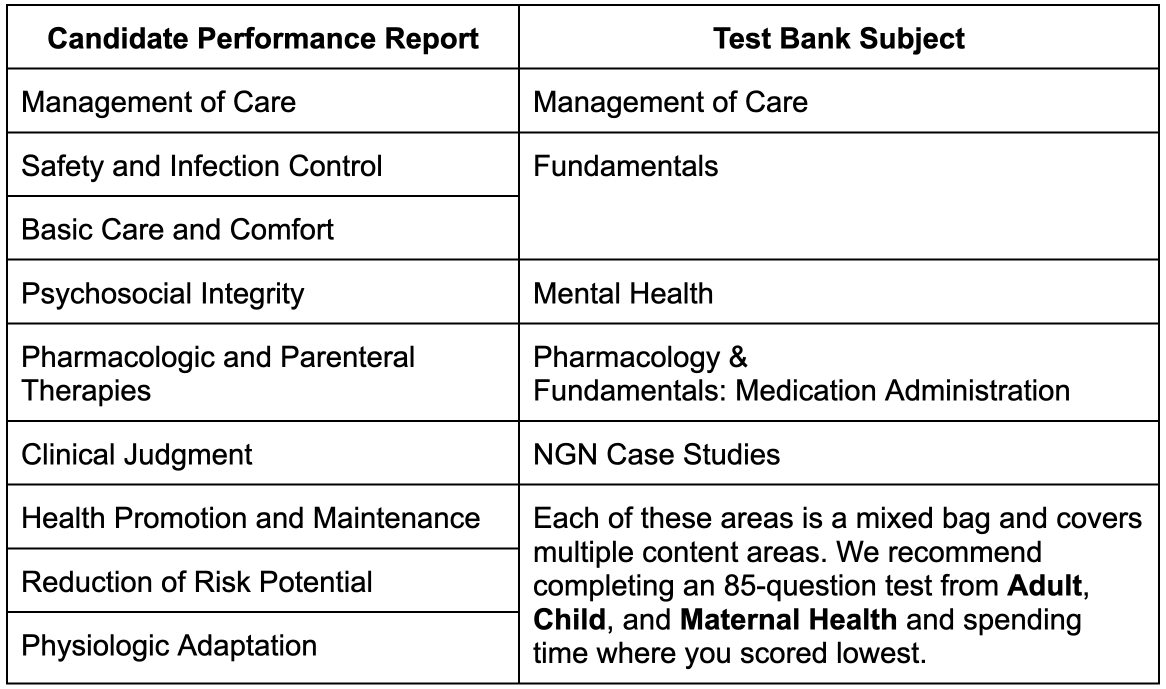
When Preparing:
- Study 4-6 hours daily
- Complete 2,000+ practice questions
- Review rationales thoroughly
On Exam Day:
- Arrive 45 minutes early
- Hide the question counter after Q30
- Use the Pearson Vue Tutorial to practice the interface
Introducing MedAnkiGen: Your AI-Powered Study Companion
Looking for a more personalized approach to NCLEX prep? Meet MedAnkiGen, the innovative AI-powered tool designed to revolutionize how nursing students create study resources.
What is MedAnkiGen?
MedAnkiGen uses advanced AI algorithms to generate custom Anki flashcards directly from your study materials. Unlike pre-made decks, our platform allows you to:
- Upload lecture notes, presentation slides, or textbook content
- Generate personalized, high-yield Anki cards
- Customize card creation to match your specific curriculum
- Save time with batch processing of study materials
Key Features
- AI-powered card generation
- Customizable card creation
- Supports multiple file types
- Seamless integration with your study workflow
Ready to transform your study strategy? Get started with MedAnkiGen and take the first step towards more efficient, personalized learning.
Additional Resources
General Resources: